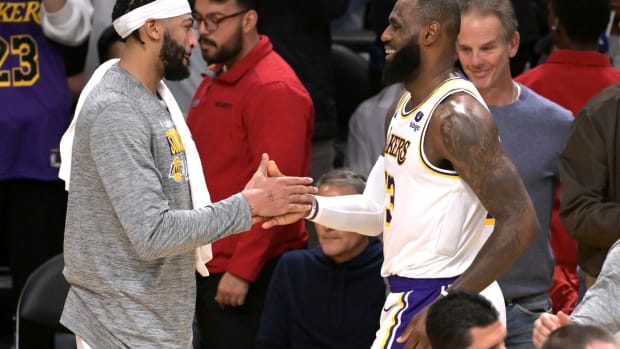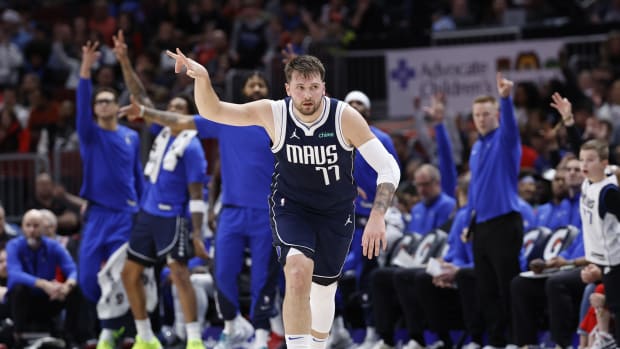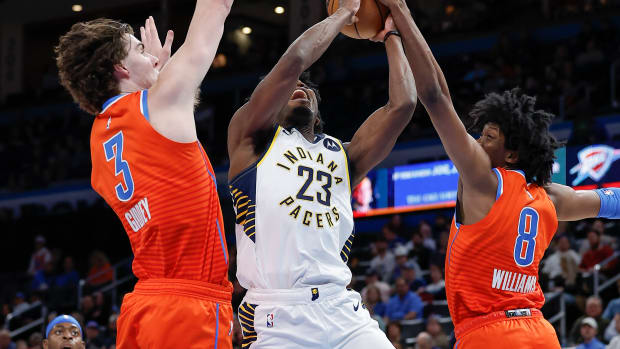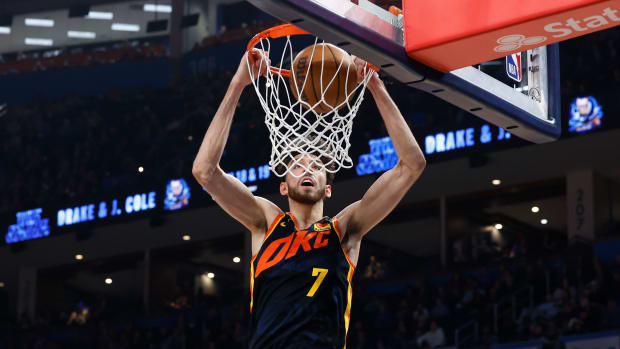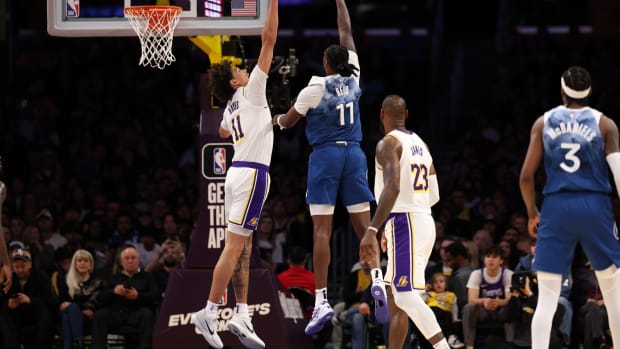David Griffin on Life With LeBron: 'If You’re Not Delivering Championships You’re Failing'
David Griffin has sat on both sides of the NBA’s success spectrum since entering the league in 1993. The former Cavaliers general manager spent 17 seasons with Phoenix, from the Charles Barkley era through Steve Nash’s battles in the West playoffs, serving as the Suns’ vice president of basketball operations from 2007-10. Griffin’s final season with Phoenix was the last gasp of the Nash era. The Suns were the league’s best offense and the fourth-fastest, sprinting to 54 wins in 2009-10. They fell to Los Angeles in six games in the West Finals, and haven’t made the postseason since.
Phoenix’s closed title window sent Griffin to a new project: rebuilding the Cavaliers after LeBron James took his talents to South Beach. Griffin began his Cleveland tenure in September 2010-11. The Cavs won 19 games that season. The following summer they selected Kyrie Irving with the No. 1 overall pick, and in 2014, James told Sports Illustrated he was coming home. Cleveland evolved from a tanker to a title contender in four years, and Griffin was tasked with maintaining a championship roster through the end of his time with the Cavaliers.
Griffin is now using his wealth of knowledge to dish out front office intel as an NBA TV analyst, including his leading role on GM School, powered by SAP. Griffin is joined by Kevin McHale and league executive Evan Wasch on the program that debuted on Wednesday, as the trio judges three fans who compete in a set of front office challanges.
Griffin discussed his 23 years of NBA experience with The Crossover, detailing the challenges of building around LeBron, his advice for Magic Johnson and Rob Pelinka and Cleveland’s tanking effort before drafting Irving.
Michael Shapiro: What kind of pressure did you feel to improve Cleveland’s roster at the trade deadline each year with LeBron?
David Griffin: It’s not just the pressure with LeBron, it’s that the only mark of success each year was winning a championship. This wasn’t about being elite. This wasn’t about winning a round in the playoffs. LeBron’s presence means you must win championships.
It was like you’re taking care of the legacy of Babe Ruth. Nobody knows who his general manager was, and nobody really knows if that general manager was successful or not. But because the Yankees won as many championships as they did, Ruth and [Lou] Gehrig and those guys’ legacies are what they are. It was something we felt responsible for. This is the greatest player of his generation, and if you’re not delivering championships you’re failing.
MS: Did the uncertainty regarding LeBron’s long-term location affect your decision-making in the final years?
DG: The nature of his contracts being one-year contracts, you always felt like you were chasing that title, and that’s a completely unique skill set in terms of team building compared to what a lot of other teams are doing. A lot of teams get to build in more long-view, mindful, sustainable way, but with the championship in sight each year, that needs to be adapted.
MS: There seems to be an idea that LeBron acts as a shadow GM in the front office. How much influence did he have during the season and in free agency?
DG: I feel really bad for LeBron that people talk about that as much as they do. It’s just an asinine assertion that he was a shadow GM. LeBron was one of many people on the team who we talked to, it just so happens he’s a basketball savant. You wouldn’t be doing your job if you didn’t talk to him about the pieces you might want to bring to the franchise. And he’s going to be an alpha leader in the locker room, and if he feels comfortable with certain players you’re bringing in, his opinion matters.
Kyrie Irving’s opinion mattered to me, Kevin Love’s opinion mattered to me. When we made the trade to acquire Iman Shumpert, J.R. Smith and [Timothy] Mozgov, the intel that we got from Mike Miller was invaluable. And everyone’s desire to be part of the process was really significant to our success. We spoke to a lot of people, and those conversations took place almost daily. We ran a family there, and it was a very natural thing to talk to our guys. So the “LeBron is the GM, all-powerful, in charge of the franchise” idea is, to me, preposterous. Now, I’m not in Los Angeles, I don’t experience anything they’re going through, but in my experience, I see a lot of the same nonsense from the media. If you are leading LeBron and you are leading your team, you’re getting incredible input from him because you asked for it.
MS: How do you think Magic Johnson and Rob Pelinka handled the trade deadline? Are you a fan of how they let the Anthony Davis negotiations play out in public?
DG: I think the teams that are most successful, sort of come in at the 11th hour under the cover of night and make a deal. I look at what [former Jazz general manager] Kevin O’Connor did when he traded Deron Williams to the Nets, by way of example. Nobody heard that coming and he made a very positive deal for his franchise and set up the future of his franchise. I think that’s how you should do things, but at the same time with LeBron, it’s very, very difficult to do that. We never kept things as quiet as I would have liked in Cleveland, but that’s because there’s so much media around the LeBron James machine. So I wouldn’t judge them or their process, but my personal preference is definitely to keep things in-house.
MS: Have you spoken with Magic or Pelinka since they signed LeBron?
DG: Well, I actually had the opportunity to go to Laker camp in the beginning of the season and I did speak to Rob a little bit. We didn’t have a real in-depth conversation by any means, but the one thing they’ve experienced already is LeBron just changes everyone’s focus and changes your timeline radically. He might have thought he was signing up for a multi-phase transition from the team they were to the team that could compete for a title, he may have bought into that, he can’t do that and feel good doing it. And so it requires a great deal of leadership on the part of the front office. You need to take LeBron where he needs to go, and he’s very willing to do that both as a teammate and a championship dictator of outcome. But you have to build in a way that’s more expedited than what they originally thought.
MS: Where do you think the Lakers will turn if they can’t land Anthony Davis this summer?
DG: I think way too much is put into the idea that you have max cap space for two max players, and therefore you must land the plane on key free agents. I don’t think that’s the case, and I don’t think you need to land the plane of Anthony Davis. You need to maximize your asset value all the time, and no harm befalls you as long as you don’t use that space poorly. So it doesn’t have to have a name attached to it, their next asset doesn’t have to be Anthony Davis. If they remain flexible they’ll be able to accumulate the right assets for the good of the franchise
MS: How did you go about trying to build a winner after LeBron left in 2010?
DG: We really had carte blanche to do what we needed to do. Because LeBron left, we were in one of those rare situations where emotionally, with the city, losing was going to be someone else’s fault. So we didn’t need to bring a ton of rhetoric to a tanking campaign, we could just go about the process of maximizing and accumulating assets. That meant we could use our cap space to get a draft pick and that pick became Kyrie Irving. We were really blessed to get to do that.
We were trying to model the Oklahoma City experiment is the best way to look at it. When Sam Presti took over in Seattle and then Oklahoma City, the way he built the team over time is what we were looking to do. We wanted to maximize assets and keep space available so when the right free agent was available we could capitalize. Fortunately for all of us, we saw that vision through when I took over, and if the greatest player of his generation isn’t from Akron, Ohio, we would have applied a different game-plan for it all.
































